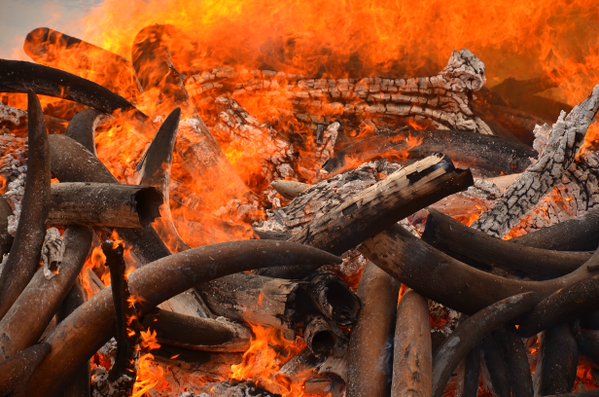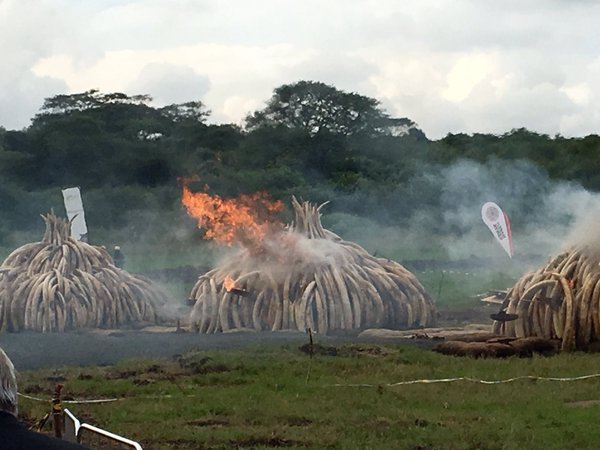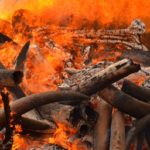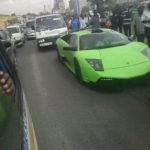Today President Kenyatta led Africa and the rest of the world in another fourth history burning of illegal ivory that had been seized from the poachers.

As this marked another remarkable step towards fighting the killing of the treasured animals, a massive wealth is tied to Kenyatta’s wealth.
The president inherited a wealth from his family that was alleged to have been tied to ivory smuggling.
During her husband’s presidency, Ngina and several other high-profile government officials were allegedly involved in an ivory-smuggling ring.
According to a report in the 1975 “New Scientist,” Ngina helped arrange for ivory tusks to be transported out of the country on state planes.
John Hoyt- an author, his research indicated that senior government officials, especially close members of the Kenyatta family, were involved in the poaching while government vehicles were used to ferry the game trophies from the wildlife sanctuaries to depots for international market.
The author singled out Mama Ngina for the butcher of the wildlife, suggesting that although she did not personally pull the trigger or unleash a poisoned arrow on elephants, she was the matron of illegal ivory poachers.
Mama Ngina, together with Kenyatta’s daughter from an earlier marriage, Margaret Wambui, who served as Nairobi’s first female African mayor, got away with the plunder of wildlife, in spite of the constant grumbling in Parliament.
According to Hornsby, the Kenyatta family was implicated in both poaching and ivory exports. Margaret was chairman of the United African Company, one of the 10 companies exporting ivory despite a ban that was in force.
At the time, a kg of ivory sold at $36 (Sh300), meaning one dead elephant was worth thousands of dollars. Zebra’s too were not spared as 5,000 were shot illegally within 320 miles of Nairobi in six months during 1975.
Colobus monkeys too were killed for their beautiful skin. Indeed, two men were arrested in 1975 in possession of 26,000 skins of Colobus monkeys but were subsequently released after producing ‘valid’ permits.
Although then Tourism minister Juxon Shako banned poaching of animals for trophies, dealers easily bribed the police. Most of the poaching, ironically, was executed by Ministry of Tourism and Wildlife personnel, who later sold the trophies to dealers. Hornsby quotes an expatriate official who allegedly identified two assistant ministers – including then Nyandarua MP JM Kariuki – buying ivory direct from Game department headquarters for export.
This was going on in 1973, when sport hunting was outlawed by then Chief Game Warden John Mutinda, who withdrew all elephant-hunting licences.
Immediately after the 1974 elections, the Kenyatta family was linked to illegal ivory trade, which was earning Mama Ngina and other close relatives $10 million (about Sh800 million) a year, as the country’s 120,000 elephants were killed at an annual rate of 20,000!
There is speculation that Mzee Kenyatta’s involvement in illegal ivory trade contributed to the murder of JM in 1975 as he was also involved in this trade.
The New Scientist magazine alleged that Kenyatta was personally involved in the trade as well as his wife, as was his nephew Ngengi Muigai, then Attorney General Charles Njonjo and former minister Paul Ngei. JM was vocal after joining a conservationist lobby led by hotelier, Jack Block, who was pestering Kenyatta to stop the illegal trade.
Kenyatta-era minister and ally Bruce Mackenzie, who was later exposed as a British spy, would later tell the British High Commission that Mbiyu Koinange, one of the racketeers and a close Kenyatta ally, was involved in the murder of JM in 1975.
In August 1975, the London-based Sunday Times exposed the alleged greed of the Kenyatta family in a series of articles that detailed its involvement in ivory exports, and the impossibility of collecting debts owed by the first family. It also detailed how Kenyatta personally approved the purchase of large farms by his family, exempting them from review by land control boards.
The newspaper identified some farms the family had acquired in the Rift Valley, including six farms owned by Kenyatta himself, a 26,000-acre farm owned by Mama Ngina in Kiambu, and her farm in Rongai next to Kenyatta’s own.
According to the Sunday Times Mama Ngina had been buying land at the Coast where she built two hotels, while Mzee Kenyatta built Leopard Beach Hotel for himself, which was registered in a Swiss company’s name.
The newspaper revealed that, in 1972, Mombasa Municipal Council had waived all rates on properties owned by the president and his family, and had listed 11 more properties in the area. The paper also described how the family operated through overseas frontmen such as George Criticos and Asian lawyers and accountants.
The family reportedly had interests in international casinos. In 1967, a company for Italian investors linked to the Mafia established the Nairobi International Casino, with Fred Kubai and later Peter Muigai Kenyatta and James Gichuru as shareholders.
The Sunday Times revealed that while Kenyatta’s name did not appear on the registration papers, he owned the site and the building, and received a third of its profits.
Kenyatta’s niece and current Health Minister Beth Mugo, meanwhile, allegedly became involved in gemstone business and obtained the right to sell gems to foreigners at Jomo Kenyatta International Airport.
Even after JM’s death, poaching went on unabated, motivating the Wilmington Star News March 2, 1977 issue to warn that the world’s last wildlife herds in Kenya were facing extinction.
According to the newspaper, poachers were organised and used bows and poisoned arrows, poisoned darts, muzzle loaders and machine guns while enjoying protection from the highest authority.
In the preceding six months prior to the publication of the story, 235 rhinos and 20 leopards had been killed while the overall elephant population had dwindled from 36,000 to 20,000.
When Ngina and the First family could not cope with the national and international condemnation any more, they issued a five-page statement through the Kenya News Agency to dismiss the poaching allegations.
The lengthy report dismissed as false allegations that Ngina was involved in poaching, terming the accusations as blackmail and scandal, further dismissing the figures of dwindled elephant stocks as “guesswork.”
The devastation occasioned by the poachers in the 1970s is such that some parts of the country like Mutomo in Ukambani have dense forests without a single wild animal, while locals bemoan the loss of their heritage to greedy wheeler dealers.














